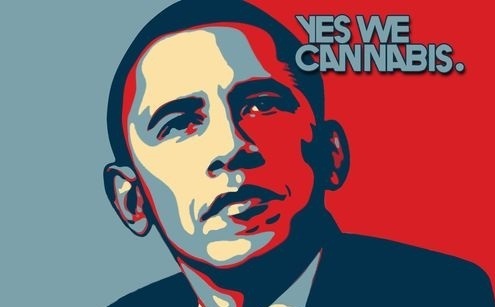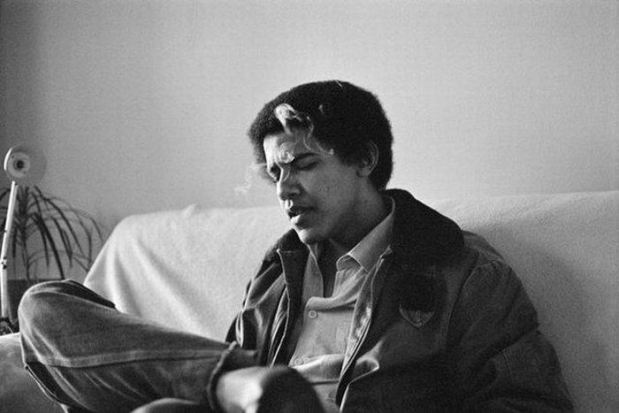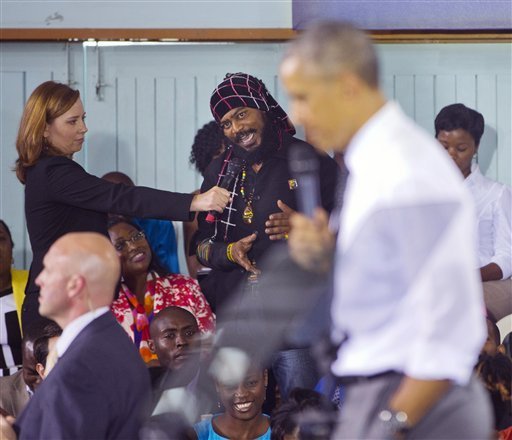During a visit to Jamaica in April 2015, Barack Obama was asked a question from the public about the process of legalization of cannabis in the United States and how it affects Latin America.
This is the longest answer he has given about this topic during the seven years as sitting president and therefore a very good opportunity to see what he has to say. The entire 7-minute video can be seen here.
In this article the entire answer is deconstructed and explained in order to see what his remaining time in office holds for the cannabis industry and its legalization.
President Obama began by saying he was going to divide his answer in two main areas: The decriminalization and legalization of cannabis in the Unites States; and the US policy towards Latin America and the Caribbean. He then proceeded to say:
“There is the issue of Legalization and the issue of Decriminalizing –or dealing with the incarceration, the devastation of communities for non-violent drug offenses.”
Obama starts off attempting to differentiate two legal instruments that have been used to deal with the adverse effects of the “Drug War”.
“Decriminalization” was the first attempt to minimize the damages brought upon society by the prohibition of cannabis. But its great Achilles’ Heel is that it keeps the entire structure of the prohibition in place and it doesn’t address the problems of massive “incarceration and devastation of communities” that he talks about. Oregon was the first US state to decriminalize in 1973 and it was quickly evident that ordering the police to look away in certain cases was impossible to implement.
The failure of the decriminalization lead to a new and very effective legal instrument: Legalization. This creates the necessary legislation, administrative rules and outlines agency responsibilities in order to make sure that cannabis is produced, transformed, bought and sold following strict rules of quality and control –just like any other product.
Even though most US states have “decriminalized” simple possession the truth of the matter is that the US has incarcerated more people than any other country in the entire history of humanity. Today one out of every four inmates around the world is a US citizen rotting away in prison.
“I am a strong believer the path we have taken in the USA, that the War on Drugs has been so heavy on emphasizing incarceration that it has been counterproductive. Young people who didn’t engaged in violence get long sentences, get placed in prison, are rendered unemployable, are pushed to the underground economy, learn crime more effectively in prison, families are devastated.”
A very good description of the consequences the “Drug War” has brought to the United States. However this is not something new, as a matter of fact this has been going on for decades untouched by several presidents from both parties and has accelerated and expanded under Obama.
But even though these negative effects have been studied and fully documented, the truth of the matter is that this is exactly what the policy planners envisioned. The “War on Drugs” is a tool of social control where vast amounts of people pass though the judicial system, are sent to jail and kept away from the public view.
This has also created a very lucrative business for the private prisons that make profits on the amount of inmates they house. For the police this is a very useful policy that has given them unchecked powers to stop and detained people who have not committed any crimes other than having a cannabis cigarette in their pockets.
Showing the amount of arrests, prosecutions, and “drugs” that have been confiscated has always been shown on the news as a sign of progress and of “doing their job”.
“We are trying to reform the criminal justice system. It is very expensive to incarcerate people and we recognize that this is not the best approach.”
Red flag: This is not happening: The criminal justice system in the United States is not being reformed. There is no discussion going on and no legislation pending in Congress to reform and the reduce the incarceration rate.
But if this is what is wanted, then the first step in this direction is precisely a reform on the legal status of cannabis. In 2013 there were more than 600,000 who went to jail for offenses related to cannabis and other drugs in the US along.
It is widely understood that prohibiting cannabis and other drugs was the primary cause on the creation of the big drug cartels that exist today. Have you ever read on a history book about the great “Drug Kingpins” of the 17th century? This is a modern creation that came with the prohibition.
“There is a second issue of Legalizing marijuana for recreational and medicinal uses. Two states have embarked on this “experiment” to decriminalized or legalize marijuana (Colorado and Washington State) and we will see how this experiment works. Right now it is not a federal policy and I don’t foresee anytime soon congress changing the law on national bases.”
Wherever there is a health need, there is a basic human right. Whatever other use people want to put before or after the word “marijuana” it’s irrelevant to the the issue here: That this is a natural medicine, used safely and with great benefits for thousands of years, and that it was made illegal only for the economic and political interests during the first decades of the 20th century.
The real “experiment” has been the prohibition regime put in place by the United States starting in the 1930s and made global by the UN Conventions of 1961, 1971 and 1988. It was around the time of the first convention that the great drug cartels started to emerge and consolidate through the use of violence.
The president put the full responsibility on Congress to act, covering himself with a thick coat of teflon as to be seen with no responsibility on this matter. The leadership of the executive branch is fundamental in any change on the way cannabis is regulated, something that has been lacking for many years now.
Finally the “experiment” of legal cannabis in the United States has been so successful that precisely Colorado and Washington decided to regulate their “recreational” markets after years developing and implementing medicinal regulations. By 2016 according to the ArcView Group Market Research there will be 14 states with “recreational” used legalized.
“If states show that they are not magnet for additional crime, that they have strong enough public healthcare infrastructure to push against and deal with increased addiction, it will create a national debate.”
This debate is going on right now! It is precisely because of the success of legalization, the displacement of crime by the legal and legitimate industry of cannabis and the reduction in crime, that every time the microphones are open the president gets asked about the legalization of marijuana.
The most effective tool to make sure there are no “criminal elements” around cannabis, is to regulate it and tax it. Adults then will have the option to purchase cannabis that has been produced with all necessary quality controls, from a legal business. The writing on the wall couldn’t be clearer.
“On paper a lot folks think that if we just legalize marijuana it will reduce the money flowing into the transnational drug trade, will increase (legal) revenues and will create more jobs, well I have to tell you that ‘it is not a silver bullet’ because if you are legalizing marijuana how do you deal with other drugs and where do you draw the line.”
This statement mixes apples, oranges with an electric drill all in the same blender. The legalization of cannabis has proven to take the control away from the hands of the drugs cartels and into the legal economy; has created a new industry that according to the ArcView Group Market Research had legal revenues for $2.7 billion dollars in 2014 and that is expected to grow to $38 billions by 2020 if it is fully legalized.
Since 1996 when California first legalized cannabis, no other drugs such as cocaine or crack have been legalized, so what is Obama talking about? The line has been clearly drawn around cannabis and it has not moved in the last 19 years.
The legalization of cannabis has actually proven to be a “silver bullet” to take an entire industry from the hands of drug cartels and into the legal economy.
“As it is true in the global economy generally, if you have a bunch of small medium size marijuana businesses scattered across the caribbean, and this is suddenly legal, if you think big multinational companies are not going to come in and market and try to control and profit from the trade, that is a very real scenario.”
Today the market of illegal cannabis is being managed by large multinational organizations called “Cartels”, extremely violent and with complete disregard for quality controls or if children use it. Is this not worse than legal and legitimate companies?
The great fear is that the big tobacco and alcohol corporations take over the cannabis business and start marketing it as aggressively as they do with their products. This has been identified and recognized long time ago and the laws that regulate the cannabis industry in the United States take it into consideration.
To consider that a full blown prohibition with jails bursting at the seams and large illegal cartels controlling the cannabis business is better than legal corporations doing it, is really the worst argument in the history of bad arguments.
The “very real scenario” he talks about is nothing more than what has been historically known as “Reefer Madness”: The original propaganda used during the 1920s and 30s in the United States to sway the public and the government into approving the prohibition that so much damage has brought to society.
It is time to leave behind all that fear and disinformation and firmly step into the 21st century.
“We have to have a conversation about this but our current policy continues to be that we need to decrease demand through a public health approach.”
A public health approach is fundamental not just for marijuana, but for the two most damaging drugs in our society today and that are widely available: Alcohol and tobacco cigarettes.
How can we talk about reducing demand for a medicine such as cannabis? When people need to treat their pain, cancers, glaucoma, epilepsy and a long list of conditions where cannabis has proven to be effective, what is the point of “reducing demand”?
On the recreational use there are plenty of steps taken to make sure that its consumption and marketing does not resemble those of alcohol and tobacco. So indeed education and public health policies are fundamental, but the great missing link is the discussion about cannabis use and its regulation at the federal level.
“We have to stop the flow of cash and guns into the Caribbean, Latin America and Central America, and at the same time the region have to cooperate with us to try to shrink the power of the transnational drug organizations that are vicious and hugely destructive.”
In order to stop the flow of guns, a pretty big step would be for the United States to stop producing and selling them so easily.
The only way the power of “Transnational Drug Organizations” can be shrunk is through legalization and education programs. Today we know that it is precisely the prohibition that has allowed for the prices of cannabis and other drugs to be incredible inflated and for large groups of criminals to take advantage from that lack of regulation.
In order to stop the flow of cash from these corporations, beside allowing legal ones to take over, is again for the United States where most of this large banks have their headquarters to be prosecuted for their crimes and not just to be slapped in the hand every now and then when a new money laundry scheme is made public.
“If we combined public health perspective; not throwing every low level person in prison but try to get them treatment and we combined this with economic development and alternative opportunities for youth we can strike the right balance. We can have a smarter approach that we currently do.”
One would think that after seven years as president some of these ideas about addressing the ever growing jail population, the failed “War on Drugs”, the treatment and the economic development would’ve been put forward, discussed publicly and made into some kind of law to make sure we all built a better society.
And even though none of these ideas have been transformed into something more than just empty words, what has really happened is the development of a well regulated, professional, widely accepted and highly profitable legal cannabis industry.
All eyes are turning towards the greatest challenge the United States and Latin America face right now, the reform of that failed policy called the “War on Drugs” and the creation of a new legal industry of cannabis.
Meanwhile all fingers, not just the middle one, are pointing in the direction of the President and the government of the United States while right under their noses the next great industry is being created: Legal Cannabis.


